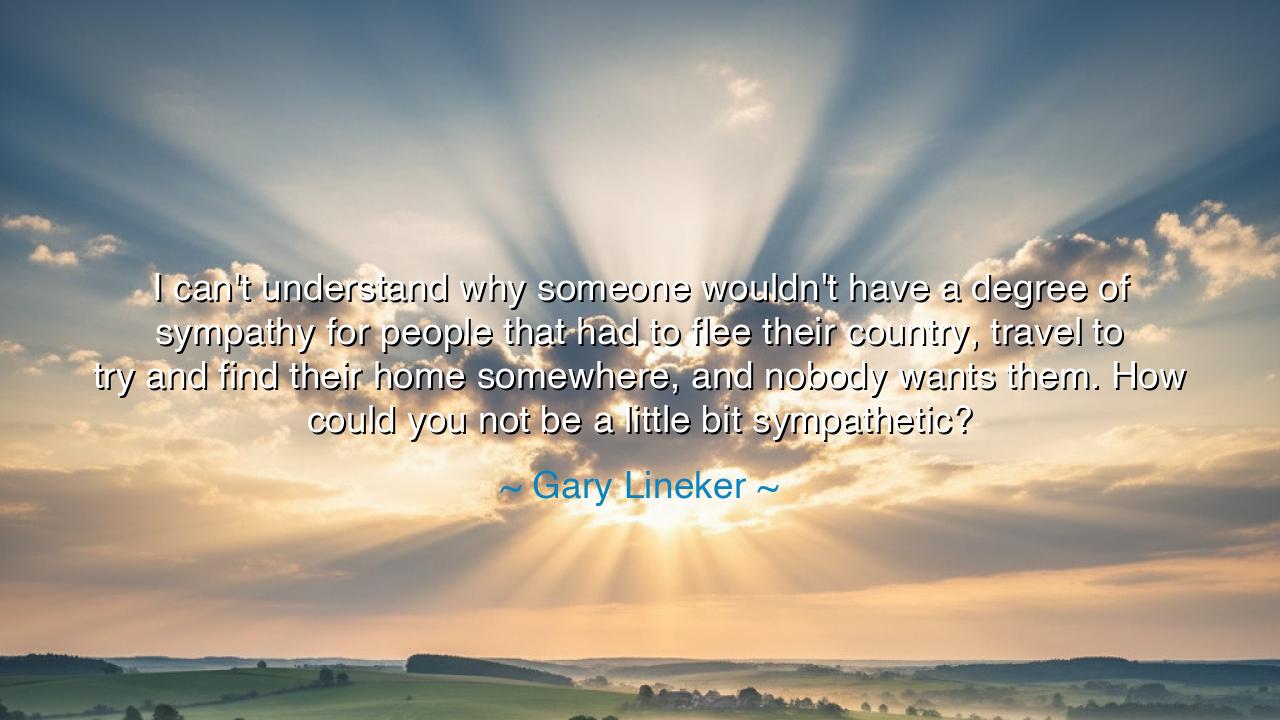
I can't understand why someone wouldn't have a degree of
I can't understand why someone wouldn't have a degree of sympathy for people that had to flee their country, travel to try and find their home somewhere, and nobody wants them. How could you not be a little bit sympathetic?






Hear, O children of compassion, the stirring words of Gary Lineker, once a footballer, now a voice of conscience: “I can’t understand why someone wouldn’t have a degree of sympathy for people that had to flee their country, travel to try and find their home somewhere, and nobody wants them. How could you not be a little bit sympathetic?” In these words, he lays bare the great contradiction of our age: that while we prize freedom, safety, and belonging, we so often deny these very things to those who have lost them.
For to flee one’s country is no small thing. It is to leave behind the graves of ancestors, the streets of childhood, the air that once carried your dreams. It is to step into exile not with joy, but with desperation, driven by war, famine, or tyranny. The refugee does not leave by choice, but by necessity, carrying nothing but hope and fear in trembling hands. How, then, can any heart fail to feel sympathy? To reject them is to forget that their suffering could one day be ours, for fortune is never fixed, and no nation is forever safe.
History itself is filled with such wanderers. Recall the tale of the Israelites, led by Moses through desert and trial, seeking a promised land. For forty years they were strangers, misunderstood, unwelcome, dependent on the mercy of others. And yet from their wandering grew a people who would shape the spiritual foundations of the world. Or consider the Irish who fled famine in the 19th century, arriving upon foreign shores hungry and desperate. At first they were scorned, yet in time they enriched the nations that had once rejected them. In every age, those who flee have carried both burdens and gifts.
Gary Lineker’s words echo this ancient lesson: to deny a refugee is to deny our own shared humanity. For who among us would not wish for shelter if the storms of war or oppression fell upon our own homes? The measure of a society is not in how it treats its powerful, but in how it treats the powerless. To close the door upon the desperate is to invite cruelty into one’s own heart. To open the door, even a little, is to uphold the dignity of humankind itself.
The deeper meaning, then, is not merely political, but spiritual. Sympathy is not weakness, but strength—the strength to see oneself in the face of another. The refugee, though clothed in rags and carrying sorrow, mirrors our own fragility, our own longing for safety and belonging. To look upon them without compassion is to blind oneself to truth. To offer them kindness is to honor the eternal bond of humanity that transcends borders and time.
The lesson, O listener, is clear: cultivate sympathy within your own heart. Do not harden yourself against the struggles of others, for tomorrow their struggle may be yours. When you encounter those who have lost home and country, give not only bread or shelter if you can, but also recognition—that they are not forgotten, not unwanted, not less than human. For sometimes the smallest act of kindness can heal a wound that no nation has yet mended.
And so, walk forward with this teaching: be a little sympathetic. Do not underestimate the power of even a degree of compassion. A kind word, an open door, an offered hand—these are not small things, but great victories against indifference. For if every person were to carry within them this seed of sympathy, the world would cease to be a place of exile, and instead become a place of shared belonging.
Thus let Gary Lineker’s words echo across generations: do not harden your heart. Remember always that the refugee’s story is humanity’s story, and to feel sympathy for them is to safeguard the very essence of what it means to be human.






AAdministratorAdministrator
Welcome, honored guests. Please leave a comment, we will respond soon